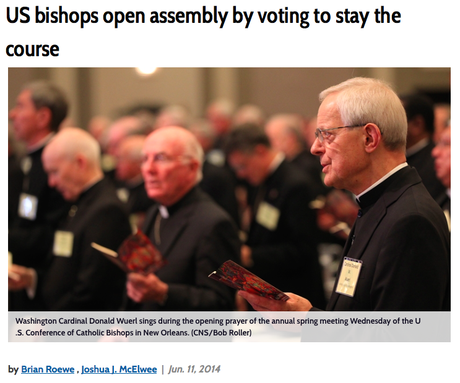
Connect the dots:
First, this happens:
Yet in this time of cultural challenge, the SBC [i.e., Southern Baptist Convention] decided to double down and turn to leadership from a culture warrior. Specifically, an anti-gay pastor with a history of histrionics and fear-mongering about The Gay Agenda. . . . Rev. Floyd not only has preached about how doing unto gay people as you would like done to you would destroy the country, he’s written a book. In his 2011 The Gay Agenda he rails on against the evils he imagines and warns against gay villians worthy of a 1950′s comic book.
As Randall Balmer notes (in a citation by Adelle Banks),
"I suppose to some degree they feel as though they’re reeling from the various same-sex marriage rulings and trying to regain their momentum" in court decisions, he said.
And then, the following day, this happens:

As Roewe and McElwee report,
Pointing to the recent string of state same-sex marriage bans struck down by federal judges, [San Francisco Archbishop Salvatore] Cordileone [chair of the U.S. bishops' Subcommittee for the Promotion and Defense of Marriage] said the country was at a "critical point."
"An amendment to the U.S. Constitution is the only remedy in law against judicial activism," he said.
The San Francisco archbishop also announced he would be attend the second annual March for Marriage in Washington, D.C., June 19. The march is organized by the National Organization for Marriage, a group advocating for legal recognition for marriage as only between one man and one woman.
And then, on the same day that the preceding events occurred at the meeting of the U.S. Catholic bishops, this happens:
Two Mormons who have gained national attention for pushing their church to ordain women to the priesthood and to accept openly gay members have been notified this week that they face excommunication for apostasy.
As I say, connect the dots — from Southern Baptists to Roman Catholics to Latter Day Saints, all of them religious bodies that have, in recent years, taken a notably hard-line stance toward their fellow human beings who happen to have been made gay by God — and what picture do you see emerging in the course of two days this week?
It seems to me Randall Balmer is correct: all three religious groups, each of which is heavily invested in defending male power and privilege (the SBC has official policies telling women to submit to men as their "heads" in marital relationships; the Roman Catholic church and Latter Day Saints officially deny ordination to women), are "reeling" from a string of judicial rulings declaring laws that specifically target LGBT people to make their lives miserable unconstitutional.
Those rulings have the strong (and growing) support of a majority of American citizens, who recognize the fundamental unfairness of singling out any minority group with the intent to make the lives of members of that minority group miserable via discriminatory legislation. You'd think that churches with any wisdom at all might take a dialogic stance to these developments, wouldn't you?
You'd think they'd want to foster dialog with the community they've singled out for special condemnation, to hear what members of that community might think about the treatment dished out to them by people claiming God as their authority for attacking, wouldn't you? You'd think this obligation to listen and learn — and to refrain from attacking, from seeking to harm — would be all the more incumbent on religious bodies claiming the Christian gospels as their foundation, wouldn't you?
But that's evidently not the route that the Southern Baptist Convention, the Roman Catholic bishops of the U.S., or the Church of Jesus Christ of the Latter Day Saints intends to take right now, is it? And I have to wonder what the intransigence fist-shaking, the bearing down on heterosexual male entitlement and heterosexual male power and privilege as the very essence of the Christian gospels, betokens for the future of these religious bodies at a time of momentous cultural shift around these very issues.
If you click the graphic, it should expand and be easier to read.

